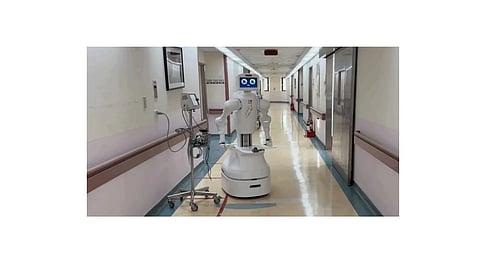

As global healthcare systems face a growing crisis due to nurse burnout, Taiwan is emerging as a model for robotic integration in clinical care. The World Health Organization warns of a projected shortfall of 4.5 million nurses by 2030. In response, tech giants Foxconn and NVIDIA are revolutionizing Taiwan’s hospitals with AI-driven solutions designed to ease the burden on medical staff.
At the forefront is Nurabot, a collaborative nursing robot developed to support healthcare professionals by taking on physically demanding and time-consuming tasks. It is part of a broader suite of smart hospital technologies created by Foxconn using NVIDIA’s cutting-edge platforms.
Nurabot isn’t working alone. Taiwan’s hospitals are deploying an entire ecosystem of AI tools — including models that monitor patient vitals and digital twins that simulate hospital environments to improve layout and operations. These innovations begin in data centers, where NVIDIA’s supercomputers train large AI models. Hospitals then use virtual twins to test and train robots before deploying them on the ground through real-time edge devices.
Major Taiwanese healthcare institutions such as Taichung Veterans General Hospital (TCVGH), Baishatun Tung Hospital, Mazu Hospital, and Cardinal Tien Hospital are already implementing these technologies. According to Shu-Fang Liu, Deputy Director of Nursing at TCVGH, “Robots are enhancing our capabilities, allowing us to focus on providing more personalized and meaningful care.”
Nurabot, developed in collaboration with Kawasaki Heavy Industries, utilizes NVIDIA Jetson Orin, Holoscan, and the Isaac platform for real-time sensing and virtual training. The robot is currently being used for medication delivery, ward patrols, and visitor assistance. At TCVGH, it helps distribute wound care kits and educational materials, reducing nurse workload by up to 30%.
Foxconn’s AI innovations also include FoxBrain, built on NVIDIA NeMo, and CoDoctor AI, a clinical platform for vital monitoring and cancer screening. It’s also contributing to the MONAI open-source ecosystem with CoroSegmentater, a tool for coronary artery segmentation.
Looking ahead, hospitals envision future Nurabot versions capable of multilingual communication, facial recognition, and even physical assistance, helping reduce fatigue and enhance patient care — a glimpse into the hospital of tomorrow.